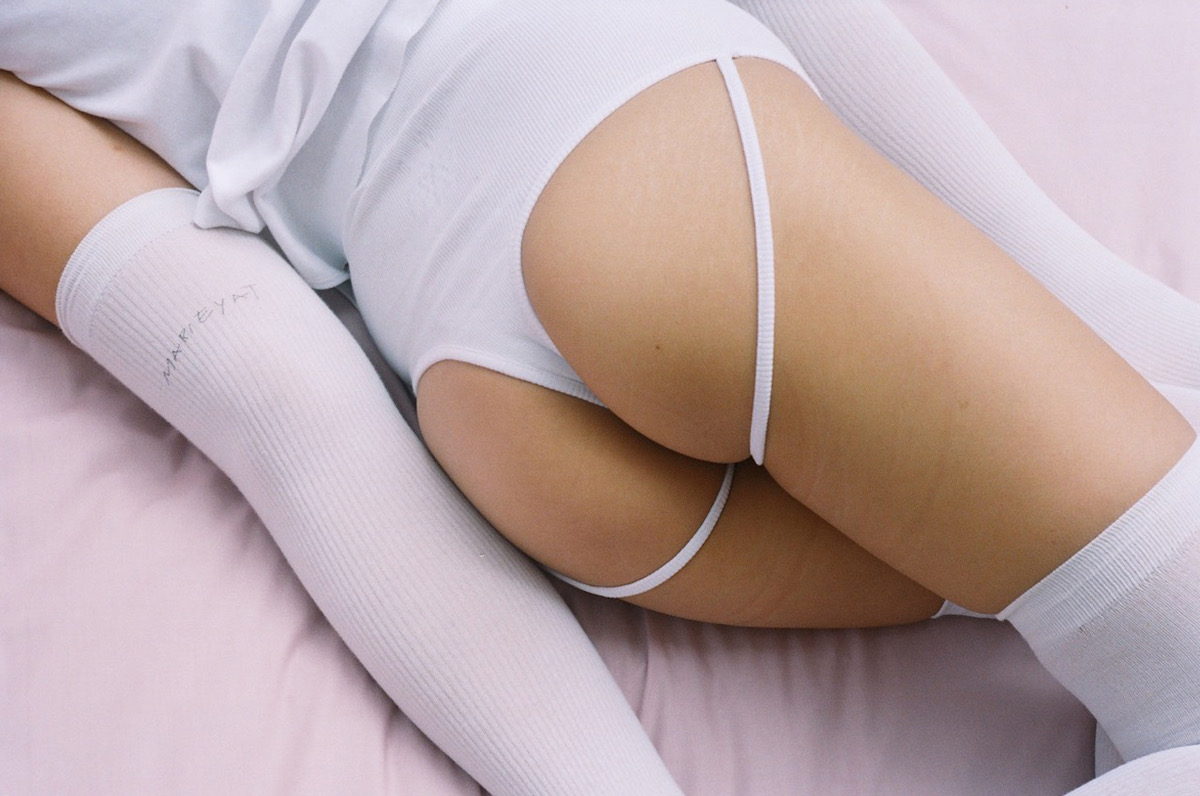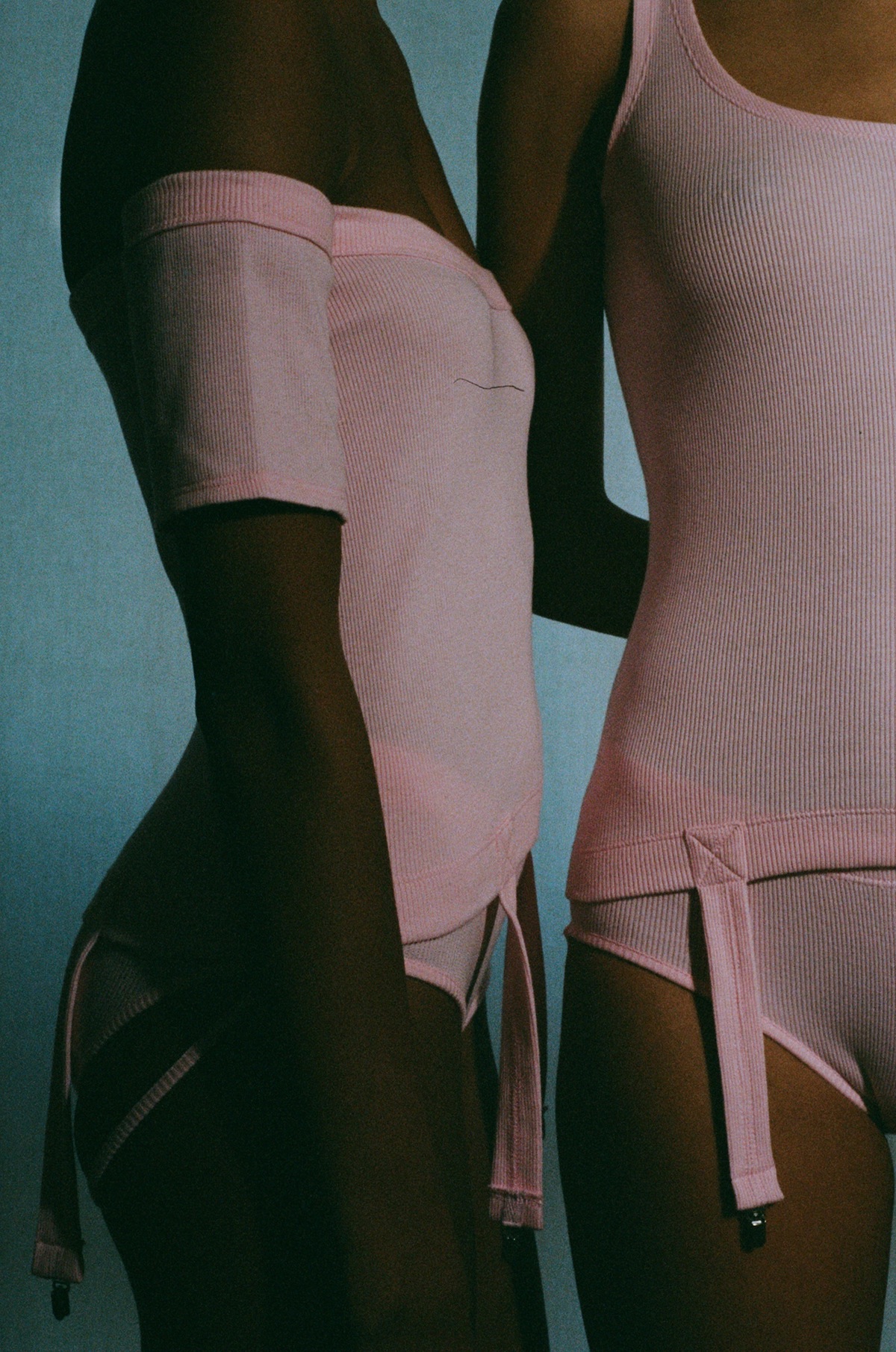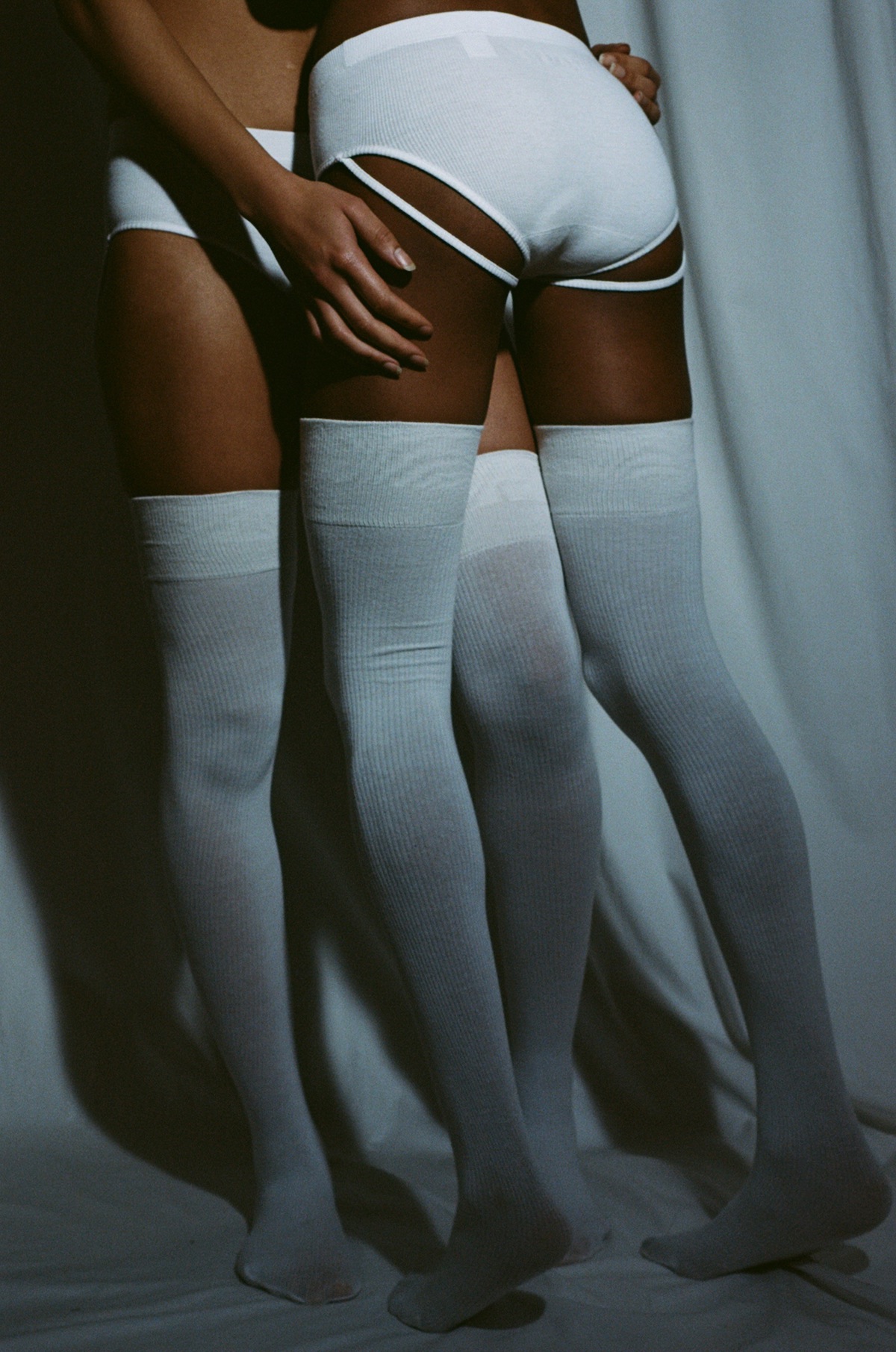Talking to Women: An interview with Maria Yeung of MARIEYAT
Culture — 28.04.20
Interview: Madeleine Morlet
Portrait: Ronan McKenzie
 In the coming weeks, Teeth Editor Madeleine Morlet will be in conversation with women from diverse creative backgrounds. Inspired by Nell Dunn’s 1965 book of the same name, Talking To Women engages with both the subject of their practice and the importance of continued dialogue.
In the coming weeks, Teeth Editor Madeleine Morlet will be in conversation with women from diverse creative backgrounds. Inspired by Nell Dunn’s 1965 book of the same name, Talking To Women engages with both the subject of their practice and the importance of continued dialogue.
Opening this interview series is Maria Yeung, the designer behind underwear label MARIEYAT. Originally from Hong Kong, and a graduate of the Central Saint Martins womenswear BA program, Maria’s work is both emotive and sensitive. In conversation she is much like her design, remarking insightfully about identity, awareness and the strength of vulnerability.
Maria Yeung: I remember trying on bras/bikinis as a teenager, and I couldn’t leave the shop without throwing a tantrum. I sort of hated my body, there was a lack of reference. I think doing a lingerie pattern cutting course [not at CSM] brought back a lot of those memories. So I thought, okay, I can do something different with underwear…
Madeleine Morlet: Your brand started with womenswear and underwear, what led you to make the decision to focus on underwear?
MY: When I was showing my friends, all of you, looking at my collection, there was quite a strong response to the underwear pieces. That sparked something in me, where I thought maybe this is quite unique. Why not focus on that and see what happens.
I have written these notes about your brand, that it’s hyper-contemporary, influenced by a lot of things, and it’s legible. It is something that has been made to be understood and is specifically female-identifying in a way that isn’t obvious or, I guess, self-consciously commercial. The underwear industry, until maybe five years ago, was led by a lot of big brands that didn’t consider natural fabrics, comfortable cuts etc, they were very much tailoring underwear for what I would say is a male gaze. Maria’s brand is sexy, but it’s sexy that women also find very sexy, outside the idea of being seen.
I would hope so yes!
Can you talk to me a little bit about the different ways you as a designer, but also we as a culture, represent beauty, and how that influences your design?
I definitely see that there has been a shift, there are a lot more women designers [now], and I think that the internet plays a big role in understanding different stories. People receive so much more information, there is a bigger understanding of difference. People are granted a platform now, and it’s great to and it’s great to see we are, for example right now we are in quarantine but we are also super connected.
Totally! The internet has never been better.
Right? So I think this definitely has contributed.
I feel like with fashion, because the industry is commercial, it is often undermined by other industries. As you said earlier, fashion is really about identity and the internet has opened up the visibility of so much identity culture. Fashion is a reflection of that but at the same time, you’re a business owner, there are so many small brands that are struggling while big brands, really the giants of industry, own so much of the commercial space. Maybe small brands have always existed in this way, but the counter culture is more ‘seen’ by a wider audience. What are your thoughts?
I would say that I agree with you, as a small independent brand I feel you’ve got your own niche, and your own following, and that becomes independent voices everywhere. But, in the mass, maybe the people who work in those spaces look at the more independent brands and can see the voice of those brands might be more individual and unfiltered. I think this is filtered down by the big brands, that is how it gets to the mass. It is the same thing that goes with, and I know we have talked about this many times, but I think it’s important to talk about it, but body diversity and having multicultural campaigns. These things have been talked about, and so many independent brands and labels have been at the forefront of that [change] and then it has been filtered down by these big brands and companies, and then it is filtered down to the masses.
Instead of filtering down from the top, it filters up. The small brands innovate and the big brands catch onto what these niche markets are doing and then cultivate it for a mass audience to understand.
I think also we need big brands to do this, as small brands have the voice but they don’t necessarily have the resources to do it. Especially for innovations, and things like that, we still need these big brands to have the radar on ‘this is a voice that needs to be heard’ and we need them to add their resources to it.
I completely agree. It’s great for big brands to take the lead of smaller brands, who have the ability to take risker moves, I guess because even though having a more diverse campaign shouldn’t be considered a riskier move, in terms of big brand thinking whatever is different to the formula that was earning them money before is a risk. Small brands have been able to really innovate because they are not held back by a history of commerce.
Yes, when you are small you can be pretty adaptable.

I ran into two teenagers who I have been shooting in Maine on a hike the other day and they told me because I’m not on TikTok, that the app has an algorithm that filters to the surface more ‘beautiful’ people. We were essentially talking about how technology is biased. I made a joke that it wasn’t that different from the industry as we know it, the Oscars, beauty campaigns, etc. That this bias exists across all platforms and technology is adding another layer to it. I’ve been thinking about how amazing it is to see this moment of change, where we are seeing more of reality, more of the physical truths, what has been hidden or glossed over, so much more of this is coming into big brand advertising, but is it a trend or is it a sea change?
I would like to believe that it’s a real cultural shift, it shouldn’t be a trend, because it is ultimately about self-acceptance. I think it’s great that big brands are doing [this] but we have to do it so much more so that it becomes something we don’t have to talk about in the future. It becomes a non-negotiable. I would like to think we’re on that path.
Me too. Would you talk a little bit about what your creative process is, and where you draw inspiration?
It always starts with some sort of emotion, or personal experience, or something my friends are experiencing. I always think of a narrative and gather imagery that can be weaved into a story. The past few collections I’ve looked at a lot of women communities in different cultures, I find it interesting because it’s something we can all relate to. I like to highlight that emotion in the collection and the campaign which comes with it.
Do you think drawing on personal experiences, as a designer, yours and those of your close female friends, do you feel like this approach, as in coming from the intimate and the personal, is a specifically female approach to design?
We learn [at school] that we have to have a concept, and I definitely have benefited from that approach, but I think what makes something different is your personal point of view, that’s what makes it yours because you are sprinkling a part of your magic on it. I think emotion is something I always want to be able to portray
I feel like emotion, particularly when looking at female artists, is what really speaks to me. Those that tell personal stories, and I don’t mean a personal story has to be obvious, it’s not ‘hi, I’m Madeliene and this happened to me’ but rather the translation of the personal and how you translate your own personal experiences.
Or an interpretation. I love to highlight pretty mundane things, but I think it reminds people of these little romances in life, this really inspires me.
How do other people’s opinions of your work affect you, and how do you deal with the vulnerability of putting something out into the world?
It’s been five years since I started MARIEYAT, in the beginning, there was always a lot of doubt. It has always been nerve-wracking to show people what I am doing, I think I’ve learnt along the way that actually it is okay to be vulnerable. For a long time, I didn’t think it was okay to show vulnerability or to feel weak, and I think that has a big link to self-acceptance.
Do you think that is generational? I definitely grew up feeling the same way.
For sure it’s generational. It’s funny because if I speak to my grandma, I remember calling her last week in tears and her first reaction is ‘Maria, stop that. Don’t cry’. We all have things built up inside that we’re not allowed to show, and now is the time to actually accept that. I’ve got emotions, and it’s okay.
I think we are living in a culture that is becoming more and more supporting, young people seem so fucking smart and wise these days.
They are so clued up. I love working with younger people. They are the non-negotiables, they have grown up with that.
What do you mean by that?
I feel like they are so aware, I am amazed a lot of the time.
So mature, considerate, open-minded, not as insecure. It makes me wonder if it’s the internet or if it’s parenting, and every generation tries to be better.
You’re also quite into astrology, but I think this has something to do with the stars.
With youth, and how they are so aware, how we have permission to be emotional, everyone is maybe more open. How we communicate has changed a lot. There is so much power in communication, in talking, in being heard. How do you feel women are being supported and supporting each other in creative industries?
The reward of doing this brand has been the community that comes with it. It’s all the women I have met, everyone has been so supportive. I love being on set with a whole woman photoshoot, it’s the best because everyone is really taking care of each other’s feelings.
I love that. It’s like a wolf pack, the female version. Do you feel like your work has given you a lot of confidence?
Oh a lot, a lot. Again, it’s the friendships that have grown from doing that has given me confidence in my work and my own personal growth.

How do you feel sexuality has evolved for women, particularly as you design underwear but also I know you are an excellent pole dancer. I’ve been watching pole videos on Instagram for years because of you, long before FKA Twigs or J Lo made it popular…
I highly recommend pole. I have so much respect for my body after doing pole dance. We’ve all been there, with insecurities about our bodies, there are so many different bodies at pole school and they don’t care because they are doing some sick stuff on the pole. Sign up. There are women in their 40’s and 50’s who are doing it and it’s just amazing.
Do you feel like what is considered appropriate for women to be doing, based on social norms, has changed significantly over the past ten years?
To be honest, I think even a couple of years ago when I first started going there pole still was very much a taboo. I would tell people ‘I go to pole dancing’ and they would say ‘so you’re a stripper’ but also, in a sense, I don’t want to say that pole dance is just a sport because the pole is where it came from, I don’t want to almost cleanse it, there is a sexy side of it and we shouldn’t deny that.
That’s really what makes it extraordinary to watch because it’s so physically challenging, it’s talent, and gym, and dance, but make it sexy.
Gwenyth, G-Tang, coined a fantastic term about pole dancing. I invited a group of friend to come and see my school showcase in December, and after seeing all the performances she was like ‘erotic gymnastics’ that’s what it is.
It is! I feel like women love watching it.
I feel like women love watching it more than men!
I’m thinking about Nell Dunn’s book, which inspired these interviews, it was written in the 1960s and parts of it still feel very relevant and other parts feel so dated. She brings up the challenges of being a wife, and mother, in almost every interview. I feel like it is still very relevant for us to have this conversation, but maybe these subjects are no longer the main conversation. What are your thoughts?
I think there is a massive movement of women being more, we can do more, but also, there are some men who are evolving width us also.
And that needs to be a part of the conversation.
There are more men who are changing their mind-sets, probably not the ones ruling the world right now but I can see that there is a bigger shift. We are talking about being able to be vulnerable, a lot of [men] are not allowed. It’s great to see not just men and women, but humans evolve to be more self-accepting, to be able to accept their vulnerability.
Accepting our limitations, embracing vulnerability, but also being accepting of other people’s limitations and embracing their vulnerabilities. Maybe what is happening is similar to that of brands, the small brands make the changes, then the big brands follow suit. When It comes to this sort of emotional and social evolution, us (the small brands) are making these changes and maybe eventually the people who are in power will experience the trickle-up effect and won’t be these fucking dinosaurs anymore.
Exactly.
Do you think about the past, the present, or the future the most?
I used to think about the future a lot, and the past a lot, recently I’ve been thinking about the present.
Is that because of this specific moment, where we can’t really escape the present, or is it more philosophical than that?
Both, it’s physical and philosophical. I realised being present is so important for your well being, so I’d like to be in the present right now.
The last thing I want to ask you is what are your secret pleasures, and private joys?
Well, I would like to say that doing pole but that’s not really a secret anymore. It probably gives me the most joy, especially at this moment. Going to the cinema alone. What’s your secret pleasure?
The small things, a naked nap in the daytime when no one is home, anything that makes me feel like I’m getting away with something gives me unbelievable joy. It has to feel naughty, even if it’s really not.
Yes, I love it. Don’t tell my accountant, but I love having a drink when I’m doing my VAT.
Things that are done where there is no witness to your experience are incredibly freeing. Make it naughty.
Stay up-to-date with Maria’s brand MARIEYAT via Instagram or their Website.